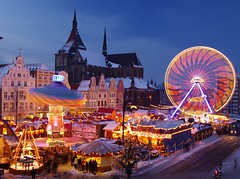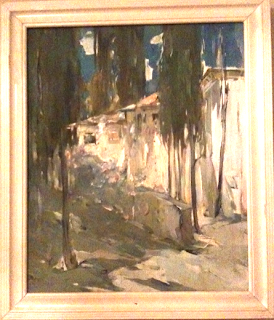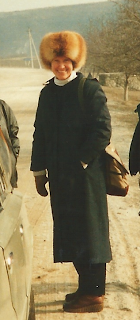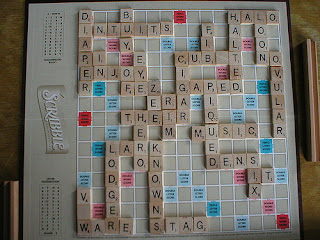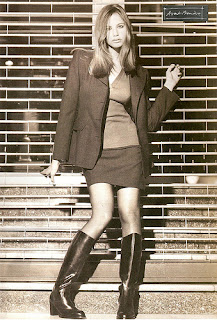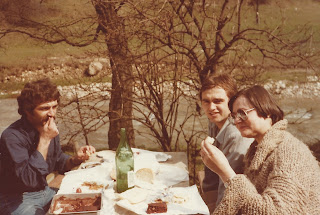I always found a way to celebrate Christmas while I lived overseas, although I often had to do without the little things that I associate with that holiday. Little things like Christmas trees. And lights. And lefse. And while my biological family was not with me for any of my around-the-world Christmases, I usually had a stand-in family until I got my own family - Alex and his son.
 |
| Iranian Christmas Tree |
There was a doctor's office in the ground floor and we understood that the doctor wanted the temperature in his office to be comfortable for his patients. I don't recall what his specialty was, but it seemed to Annie and me that his patients must not have had to take off many clothes to be examined. Our apartment was so cold that I used to keep my clothes on the top of the bedclothes so I could drag them under the covers in order to dress to avoid having to put my feet onto the cold floor.
We had no tree that first year. Instead, a small evergreen plant that a boyfriend who turned out not to be so reliable had given me served as our holiday tree.
The second year in Iran, Christmas coincided with the most inexplicable Shi'ite holiday of them all, Ashura. That meant everything was closed for Christmas: restaurants, theaters, night clubs, everything that might be construed as providing entertainment. We could get together in our homes, but we had to be careful not to be overheard. I also learned about the difference in the Orthodox calendar which is about two weeks behind our calendar. So while Christmas coincided with Ashura for us, there was another opportunity to observe Christmas just around the corner, on January 7.
I spent that Christmas with my surrogate family - Patty, Cheryl, Neal, Shirley, and Maureen. There may have been others there as well, but those five were the core for me. We exchanged gifts, but mostly for the fun of watching one another open them. For example, Patty received a bottle of White Out because we all knew her alter-ego, Patty Black, who appeared after a few drinks and whose tongue had an acid edge to it. But we loved both Patties and had a good laugh when she opened the package.
 |
 by Resident on Earth |
I saw the Eiffel Tower, Cathédrale Notre Dame, la Basilique du Sacré Coeur de Montmartre, Musée du Louvre, Château de Versailles, Centre Georges Pompidou, Arc de Triomphe, the Champs-Élysées, all on the list of the top 10 must-see sights of Paris. Another couple from Iran joined us for Christmas dinner, extending my pleasant experiences of Iran and helping me push away the unpleasant memories.
Next stop: Germany. While Christmas in Paris was magical, Christmas markets in Germany are enchanting. They are a little like a carnival fair with plenty of hawkers selling items such as scarf rings, hand-held vacuum cleaners, and silver polish, but there are so many wonderful and colorful things to see and food and drink to smell and consume that the commercial side isn't distracting. Since my household effects hadn't arrived yet by Christmas, I didn't have my usual Christmas decorations to put up in my apartment. After a couple of afternoons wandering through the Christmas market, I decided I had to have a tree. I bought a very small pine tree and then stocked up on wooden ornaments from the market to fill it with jewels.
My second Christmas in Germany was spent in England where friends from Romania, Gayle and Roger, lived. In addition to getting an introduction to life in England, Gayle and Roger introduced me to their other houseguest, a teacher from China on an exchange program in England for a few months. Having her with us as we traveled in their neighborhood was a good balance for my observations. Every time I noticed something, such as how small many of the homes in England are, she observed the opposite from her Chinese viewpoint, that homes in England are large. She helped keep things in perspective. |
Roger let Gayle and me pick out the Christmas tree that year. We got one just the right height, but it had a kink not noticeable from the angle we looked when picking it out, making it lean over ever so slightly.
 |
| PJ and Heather in front; Sandra, Zofia, Pete, and Marge in back |
By the second Christmas in Doha, I had met Alex, but he flew back to England to be with his son. I knew they planned to travel through Scotland so when I heard about Pan Am Flight 103 crashing over Lockerbie, I was frantic to know where they were. Alex didn't think to call to let me know they were fine, although on Christmas Day when I was at the house of our friends Alex and Jean, he called five times just to be sure I was OK and we were having a good time.
That's what happens when a telephone guy goes on vacation - he makes phone calls home all the time, except when I want to hear from him.
